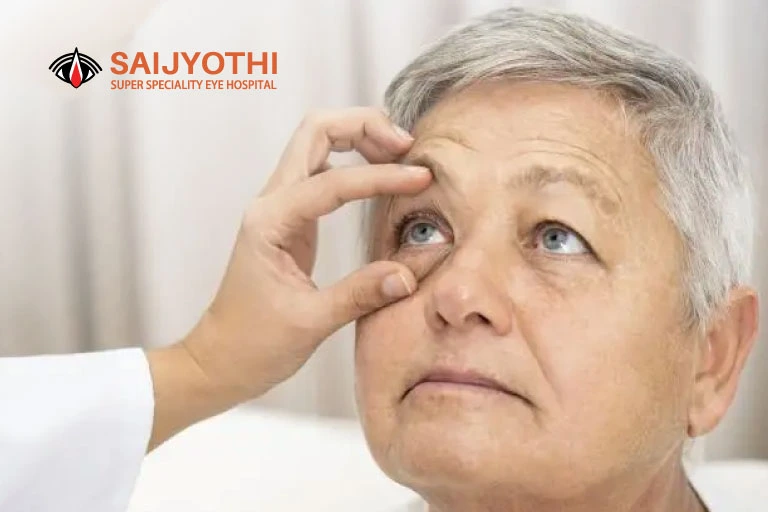How to Manage Dry Eye After Cataract Surgery? Causes, Treatments & Long-Term Relief
Dry eyes after cataract surgery can be unsettling. Your vision might be sharper, but the discomfort of dryness and irritation may leave you wondering if something went wrong. Don’t worry! You’re not alone. Post-surgery dry eye is a common but manageable symptom. Most cases are temporary, and understanding the causes and available treatments can help you find relief.
This guide will take you step-by-step through why dry eye happens, how long it lasts, and the best remedies—from immediate relief to advanced therapies. Whether you’re experiencing mild discomfort or more persistent symptoms, this guide is here to answer your concerns.

AUTHOR
Ophthalmologist/ Eye Surgeon 13+ Years Exp
MBBS, MS – Ophthalmology
CONDITION
CALL US 24/7 FOR ANY HELP
GET IN TOUCH ON
Why Does Cataract Surgery Cause Dry Eyes?
During cataract surgery, your eye undergoes trauma (albeit mild) that can temporarily disrupt its delicate tear film. The tear film, which keeps your eyes lubricated, can be destabilized for several reasons during the procedure:
- Tear Film Disruption: Instruments used in surgery may affect the natural layer of moisture on the eye’s surface.
- Corneal Nerve Interruption: Corneal nerves that help regulate tear production can be temporarily affected, reducing tear output.
- Inflammation: Post-surgery inflammation can interfere with the eye’s natural hydration.
⇒Pre-Existing Risk Factors
Some individuals are more prone to developing dry eye after cataract surgery due to underlying conditions:
- Age (50+ years)
- Diabetes
- Autoimmune diseases (e.g., Sjögren’s Syndrome, rheumatoid arthritis)
- History of dry eye or blepharitis (chronic eyelid inflammation)
- Long-term contact lens wear
New Insight: The type of cataract surgery technique also plays a role. For instance, femtosecond laser-assisted surgery may have a slightly different impact on tear production compared to traditional methods.
📌 Key Takeaway: Dry eye after surgery is usually temporary and related to the healing process, but pre-existing conditions can intensify symptoms.
How Long Does Dry Eye Last After Cataract Surgery?
The duration of post-surgery dry eye varies from person to person. For most, symptoms resolve within 2-4 weeks, but those with pre-existing risk factors may take longer, sometimes up to 2-3 months.
⇒Warning Signs to Watch For
While mild discomfort is normal, consult your ophthalmologist immediately if you notice:
- Severe or worsening dryness
- Redness or inflammation accompanying dryness
- Sharp vision decline or pain
📌 Key Insight: Dry eye is usually mild and temporary, but persisting or severe symptoms require medical follow-up.
Best Treatments for Dry Eye After Cataract Surgery
A. First-Line Treatments (Immediate Relief)
- Artificial Tears (Eye Drops)
- Quick and effective for improving lubrication.
- Opt for preservative-free options, as they’re gentler on sensitive post-surgery eyes.
- Warm Compresses & Eyelid Hygiene
- Helps reduce inflammation and improves oil flow from meibomian glands (essential for tear quality).
- Pro Tip: Use a clean, warm cloth or dedicated eye masks.
- Avoiding Environmental Triggers
- Wind, fans, air conditioning, and prolonged screen time can worsen dryness.
- Humidifiers are excellent for maintaining moisture levels in your environment.
B. Prescription & Medical Interventions
- Anti-Inflammatory Eye Drops
- Steroid drops and cyclosporine (Restasis) reduce post-surgery inflammation that contributes to dryness.
- Your ophthalmologist will determine the best option based on severity.
- Steroid drops and cyclosporine (Restasis) reduce post-surgery inflammation that contributes to dryness.
- Punctal Plugs
- Tiny plugs inserted into tear ducts to prevent tear drainage, keeping your eyes naturally moisturized longer.
- This is especially useful for moderate-to-severe cases.
- Tiny plugs inserted into tear ducts to prevent tear drainage, keeping your eyes naturally moisturized longer.
- Autologous Serum Eye Drops
- Made from your own blood, this therapy is gaining popularity for treating chronic dry eye as it contains healing growth factors.
- Used for severe and persistent cases.
📌 New Therapy Alert: Advanced treatments like Plasma Rich in Growth Factors (PRGF) are emerging as effective options, though still under the radar for many patients.
C. Dietary & Lifestyle Modifications
- Omega-3 Fatty Acids
- Foods like fish (e.g., salmon, tuna) or supplements improve tear quality and reduce eye dryness.
- Plant-based sources include flaxseeds and walnuts.
- Stay Hydrated
- Drinking plenty of water prevents tear film evaporation.
- Drinking plenty of water prevents tear film evaporation.
- Proper Eye Drop Technique
Follow these steps:- Wash your hands thoroughly.
- Tilt your head back and pull down the lower eyelid.
- Place one drop into the pocket created (not directly onto the cornea).
- Blink a few times gently.
- Wash your hands thoroughly.
📌 Pro Tip: Combine these approaches for holistic relief.
Can Dry Eye Become Permanent After Cataract Surgery?
The short answer? Rarely.
While most cases resolve, chronic dry eye can persist for individuals with severe pre-existing conditions or complications during surgery.
⇒Long-Term Management Strategies
- Ophthalmologist-supervised care for chronic symptoms.
- Consistent use of high-quality artificial tears.
- Diet and hydration adjustments tailored for eye health.
🔔 If dryness significantly impacts your life beyond three months, consult an eye expert in hyderabad for advanced therapies.
📌 Key Insight: Early intervention improves long-term outcomes.
FAQs on Managing Dry Eye After Cataract Surgery
Q1. What is the fastest way to relieve dry eye after cataract surgery?
Use preservative-free artificial tears hourly on the first few days post-surgery and avoid irritants like wind or screens.
Q2. Can I use my regular dry eye drops after cataract surgery?
Yes, but it’s better to consult your doctor for post-surgery specific recommendations.
Q3. Are preservative-free drops better than regular ones?
Absolutely. Preservative-free drops reduce irritation, especially important for sensitive, healing eyes.
Q4. Does cataract surgery worsen pre-existing dry eye?
It can temporarily exacerbate symptoms, but this usually improves with post-surgery treatments.
Q5. Can I use contact lenses if I have dry eye post-surgery?
Wait until symptoms subside and your ophthalmologist gives the green light.
Final Thoughts
Dry eye after cataract surgery is a temporary hiccup on the road to clearer vision. With the right treatment plan—including artificial tears, good eye hygiene, and dietary changes—you’ll soon be back to enjoying life without discomfort.
Remember:
- For mild symptoms, first-line treatments like artificial tears and warm compresses often suffice.
- If symptoms persist, explore advanced therapies under your doctor’s guidance.
📌 Call-to-Action: Experiencing discomfort? Contact an ophthalmologist today for a tailored treatment plan.
AUTHOR
Ophthalmologist/ Eye Surgeon 13+ Years Exp
MBBS, MS – Ophthalmology
CONDITION
CALL US 24/7 FOR ANY HELP
GET IN TOUCH ON
Appointment Form
About Us
Saijyothi Eye Hospital, where excellence meets compassion. Founded by the esteemed Dr. Saibaba Goud, M.S., Ph.D., Padma Shri Awardee, our institution stands as a beacon of hope for those seeking exceptional eye care. Dr. Saibaba Goud’s vision goes beyond restoring sight, aiming to transform lives. At Saijyothi Eye Hospital, we offer exceptional care, from routine eye exams to advanced surgeries, with personalized services tailored to each patient’s needs.
Our Locations:
West Marredpally
- Plot No 185, Road No 1 Beside Kennedy School, Opposite lane to Om Shanthi Foods, West Marredpally, Secunderabad-500026.
Kompally
- 3rd Floor, Vaishnavi Lemini Arcade, Doolapally Road, Above Ratnadeep Super Market, Devender Colony, Kompally, Hyderabad, Telangana 500014
Uppal
- D.No. 2-2-15, Hanuma Sai Nagar, Uppal X Roads, Near Gandhi Statue Centre, Uppal, Hyderabad, Telangana 500039

